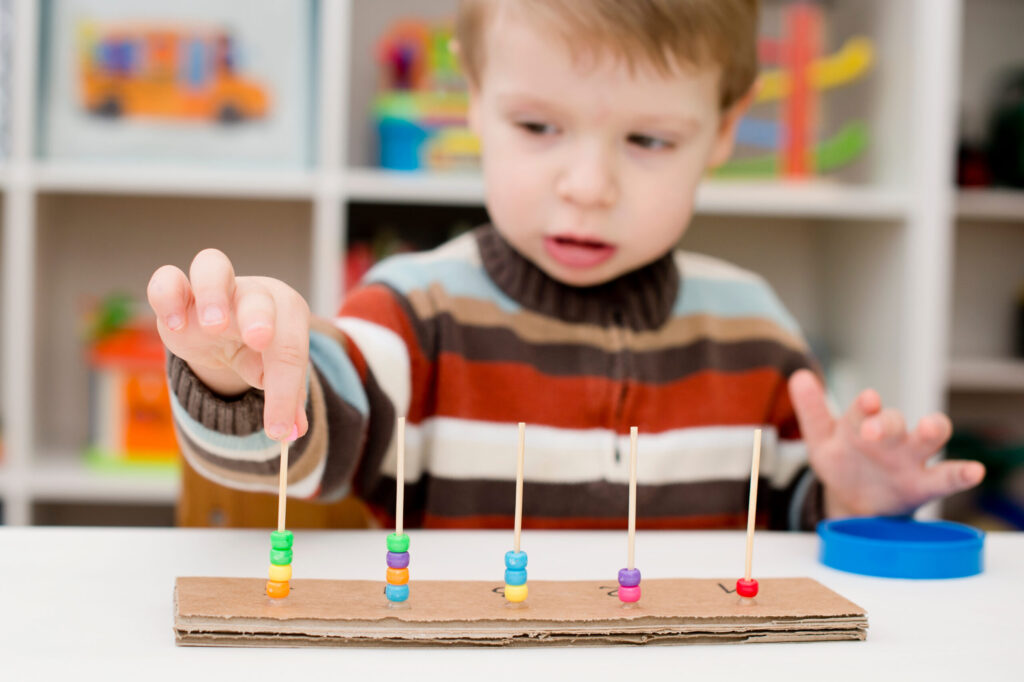Is Your Child Having Sensory Motor Difficulties? Learn How We Can Help.

If you’re a parent, your child’s healthy development is likely your top priority. Mastering sensory motor skills, or what we use to gather information about the world through our senses and develop our body’s motor response to that information, is a critical stage in your child’s development.
Every day, we use sensory motor skills, from brushing our teeth to holding objects in our hands. It’s easy to become anxious or overwhelmed if your child appears to struggle with this skill set.
The good news is that with the assistance of a pediatric therapist at Skills on the Hill, you can improve your child’s sensory motor skills in various ways.
At our Washington, DC and Arlington, VA clinics, we are committed to helping your family and equipping your child with the tools they need to participate in and enjoy life fully. If you believe your child could benefit from pediatric therapy services, contact Skills on the Hill today to schedule an appointment with one of our movement experts.
What is a sensory-motor disorder?
If your child has been diagnosed with a sensory motor disorder for a while, you’re likely already familiar with the ins and outs of this sort of condition. But if your child was recently diagnosed, you may have countless burning questions. What is a sensory-motor disorder? What does this mean for my child? And most importantly–what can I do to help them?
If you’re overwhelmed with questions and don’t know where to turn, don’t panic. Our experienced team is here to support you and your family and answer any questions you may have.
To understand what a sensory-motor disorder is, we must first understand what sensory motor skills are. As stated before, sensory motor skills describe the tools we use to gather information about the world through our senses and develop our body’s motor response to that information. For example, if a speeding bike were racing toward you, you would rely on your sensory motor skills to jump out of the way.
We use our vision, hearing, taste, touch, balance, and spatial orientation systems to take in information about the world.
If your child has a sensory-motor disorder, they may struggle to accomplish the following tasks:
- Walking, sitting, or crawling
- Using toys or catching objects
- Dressing or brushing their teeth
- Writing, coloring, or drawing
- Difficulties understanding, tolerating, and participating in everyday life situations
- Playing sports
Fortunately, the pediatric therapists at Skills on the Hill can help your child improve their sensory motor skills and strengthen their independence.
How will Skills on the Hill help my child?
At Skills on the Hill, our team of pediatric therapists have experience treating children with sensory motor issues and know what treatments work.
When you first come to our Washington, DC or Arlington, VA clinic, your child’s occupational therapist will conduct an evaluation, including a thorough medical history. A sensory questionnaire will also be given to the parent so the therapist can learn how your child reacts to different types of sensory input.
Several motor skill areas, coordination, balance and postural control, attention, toleration of different types of movement, responses to touch, activity and arousal level, and sequencing and following instructions may be assessed during the evaluation.
Following the evaluation, you will receive a detailed report summarizing impressions and recommendations for the next steps. Furthermore, a meeting will be held so that the therapist can explain details from the evaluation, answer any questions you may have, and provide a description of what therapy will look like if it is recommended.
Your child’s treatment plan may include a variety of exercises that focus on strength development, grasping, bilateral coordination, and hand-eye coordination.
You may also be asked to help your child perform their exercises and movement patterns at home in between sessions. This will help your child progress through their treatment plan faster and achieve better results in the office.
Examples of the exercises that may be a part of your child’s treatment plan include the following:
- Bilateral activities such as coloring in simple shapes and playing with legos and blocks.
- Activities that promote hand strength such as popping bubble wrap and playing with play dough.
- Playing catch with a light ball to help improve hand-eye coordination.
- Cutting along lines and transferring stickers from a sticker book to help improve grasping skills.
Set your child up for success, contact Skills on the Hill today!
Have you noticed your child struggling with their sensory motor skills? Our team of pediatric therapists is committed to providing your child with all the help they may need. Contact our Washington, DC or Arlington, VA clinic today to schedule an appointment with one of our dedicated staff members.
We are looking forward to serving your family.
Sources:
https://www.nicklauschildrens.org/conditions/sensory-motor-deficits


